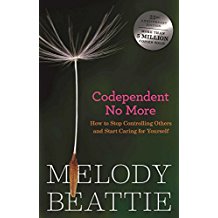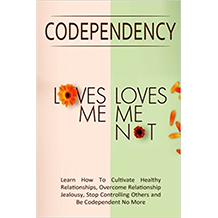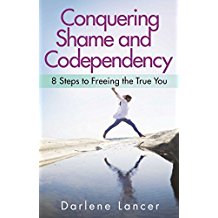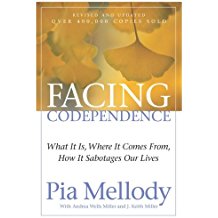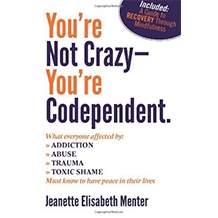
16 Jun Codependency Recovery: Get Your Life Back
More often than not, as alcoholics and addicts, we struggle with some form of codependency. Codependency recovery is not black and white, by any means. Codependency can manifest itself in a variety of ways: people pleasing, manipulation, narcissism, drama-loving, controlling, stalking, ‘doormat’ syndrome, and more.
``When we can really be anchored and rooted in this love that exists within us, then we're not dependent on this other person, fearfully holding them to be responsible for a love that actually we can only ever find and access from within us`` -Meggan Watterson
The term ‘codependent’ generally has a negative connotation. We use the term to inflict emotional pain on someone by saying: “She/He’s sickly codependent,’ ‘I wouldn’t date him/her, they’re too codependent,’ or “What’s wrong with him/her? They’re so sensitive and codependent.”
Most people tend to forget that codependency is a disease, just like alcoholism. It is centered in the brain, which is why most of us alcoholics and addicts suffer from codependency; if not with people, then certainly with our drug of choice (this includes alcohol).
Codependency recovery is not something to be ashamed about, rather, something to address in an attempts to ease the chaos of your inner-self.
Just for the duration of this article, I want you to give yourself a break; put aside the preconceived notions you have about codependency just for the next 10 minutes while reading this article and let yourself explore the topic of codependency recovery. This does not mean you have to admit you are codependent, it simply means you are allowing yourself to have an open mind for long enough to take in some of this information that may or may not help you determine a trouble spot in your recovery.
What is Codependency Recovery?
After reading many, many definitions of codependency recovery, I have settled on this definition from Codependency for Dummies:
``Someone who can't function from his or her innate self, and instead, organizes thinking and behavior around a substance, process, or other person(s)``
Innate basically means the essential characteristics of a person; the core of what makes you, you.
Finding Your True Self
How Do I Know if I’m Codependent?
When I delved into the possibilities of having a tendency of codependency, I initially scoffed. I thought: “Codependents are obsessed girlfriends who need to know everything their significant other does. They show up to ‘surprise’ their significant other, in an attempts to catch them doing something wrong… They are basically nutty women.”
But, what I didn’t realize was that while this may be one outlet of codependency, there is so much more to codependency recovery than a simple obsession with a person.
These signs of codependency are taken from Codependents Anonymous. I choose this list because it is the most all-inclusive list on the internet at present:
Patterns and Characteristics of Codependence
Denial Patterns
• Have difficulty identifying what they are feeling.
• Minimize, alter, or deny how they truly feel.
• Perceive themselves as completely unselfish and dedicated to the well-being of others.
• Lack empathy for the feelings and needs of others.
• Label others with their negative traits.
• Think they can take care of themselves without any help from others.
• Mask pain in various ways such as anger, humor, or isolation.
• Express negativity or aggression in indirect and passive ways.
• Do not recognize the unavailability of those people to whom they are attracted.
Low Self-esteem Patterns
• Have difficulty making decisions.
• Judge what they think, say, or do harshly, as never good enough.
• Are embarrassed to receive recognition, praise, or gifts.
• Value others’ approval of their thinking, feelings, and behavior over their own.
• Do not perceive themselves as lovable or worthwhile persons.
• Seek recognition and praise to overcome feeling less than.
• Have difficulty admitting a mistake.
• Need to appear to be right in the eyes of others and may even lie to look good.
• Are unable to identify or ask for what they need and want.
• Perceive themselves as superior to others.
• Look to others to provide their sense of safety.
• Have difficulty getting started, meeting deadlines, and completing projects.
• Have trouble setting healthy priorities and boundaries.
Compliance Patterns
• Are extremely loyal, remaining in harmful situations too long.
• Compromise their own values and integrity to avoid rejection or anger.
• Put aside their own interests in order to do what others want.
• Are hyper-vigilant regarding the feelings of others and take on those feelings.
• Are afraid to express their beliefs, opinions, and feelings when they differ from those of others.
• Accept sexual attention when they want to love.
• Make decisions without regard to the consequences.
• Give up their truth to gain the approval of others or to avoid change.
Control Patterns
• Believe people are incapable of taking care of themselves.
• Attempt to convince others what to think, do, or feel.
• Freely offer advice and direction without being asked.
• Become resentful when others decline their help or reject their advice.
• Lavish gifts and favors on those they want to influence.
• Use sexual attention to gain approval and acceptance.
• Have to feel needed in order to have a relationship with others.
• Demand that their needs be met by others.
• Use charm and charisma to convince others of their capacity to be caring and compassionate.
• Use blame and shame to exploit others emotionally.
• Refuse to cooperate, compromise, or negotiate.
• Adopt an attitude of indifference, helplessness, authority, or rage to manipulate outcomes.
• Use recovery jargon in an attempt to control the behavior of others.
• Pretend to agree with others to get what they want.
Avoidance Patterns
• Act in ways that invite others to reject, shame, or express anger toward them.
• Judge harshly what others think, say, or do.
• Avoid emotional, physical, or sexual intimacy as a way to maintain distance.
• Allow addictions to people, places, and things to distract them from achieving intimacy in relationships.
• Use indirect or evasive communication to avoid conflict or confrontation.
• Diminish their capacity to have healthy relationships by declining to use the tools of recovery.
• Suppress their feelings or needs to avoid feeling vulnerable.
• Pull people toward them, but when others get close, push them away.
• Refuse to give up their self-will to avoid surrendering to a power greater than themselves.
• Believe displays of emotion are a sign of weakness.
• Withhold expressions of appreciation.
Source: Codependents Anonymous
If you can identify with one or two from each section, an entire section, or maybe every bullet point listed, this is a great start!
I suggest printing out this article and highlighting the ones you identify with. You’ll notice that the more you look at this list, the more you identify with certain behavioral patterns now that you are aware of them.
One Person’s Codependency Recovery Story
I always held the opinion that I could never be codependent because I spent so much of my time preventing codependent behaviors in my romantic relationships. I would make sure not to text back right away; I would make sure to be unavailable ever so often, to maintain my independence; I would limit the time I allowed myself to spend with my significant other, in order to keep the ‘spark’ alive.
What I didn’t realize was that my codependency had little to do with my romantic relationships and a lot to do with my relationship with my parents, primarily with my father.
As far back as I can remember, I would look to my dad for approval before I accepted my own success or failure.
When I was ice skating competitively or playing soccer, I would look over to the sidelines and the crowds for a nod from my father when I made a great save or landed a killer jump. If I made a mistake, I would look over to the sidelines in fear that he would shake his head at my mistake, or tell me I did a horrible job.
In high school, I would be petrified if I got a bad grade on an exam; I would hide my exam, and just wait with utter dread for the moment he called me out on it. I had punished myself enough for the both of us, and his punishments would never be as awful as the ones I put myself through.
When I decided to forfeit my soccer scholarship at University because I was burnt out of both soccer and life at the time, I truly don’t believe I would have done so if I didn’t have my dad’s OK.
When I went to community college for a year, I did some soul searching to figure out what I really wanted to do with my life, and penetrating the fashion industry was something that resonated with me. I enrolled in all fashion courses from design to sewing with my own money, and I had a plan to go to FIDM in Los Angeles or Parsons in New York. When I got home from my first day of classes with high aspirations and extreme excitement about the prospect of becoming a fashion icon, I told my dad the good news and he replied: “You’re too smart to go to fashion school.” I dropped all of my classes and enrolled in English, Science, and History classes.
You see, I didn’t realize that these were codependent behaviors. I thought that you were supposed to listen to your parents and do what they say because, well, they knew more than I did. I wasn’t just listening to a suggestion from my dad… I was taking everything he said as my reality and essentially living the life he wanted for me, not the life I wanted for myself. I didn’t even know what kind of life I wanted for myself.
When I got sober, I realized I had a lot more going on than just a drinking problem. So, I started a CoDA meeting with a friend of mine, and we learned as much as we could about codependency recovery. Some of our friends inquired about the meeting with interest, and the meeting grew into a 10-15 person group, which allowed us to open up the meeting for dialogue and suggestion.
I realized that the major decisions I made over the course of my life were based out of fear for my father’s approval. I learned to enjoy a few things of my own, without talking to my dad about it. I felt guilty that I wasn’t keeping him involved in my day-to-day decision making, but it got easier and easier the longer I did it.
Slowly, I developed some boundaries (for myself more than my dad), and I stuck to them with the help of friends who understood my codependency recovery struggles.
The funny part: when I started making decisions for myself, my dad told me he was proud of me. He said that all he ever wanted was for me to be successful and independent. I was now making independent decisions based on what I wanted to do, and he was happy.
Codependency Recovery Literature
Each of these books has been taken from the Amazon Best Seller list and received 4.5 stars or higher.
Some you may have heard of, some may seem obsolete, but the best way to learn at your own rate is by the written word.
Here are five fantastic books on codependency recovery (click on any book image to go to the Amazon listing):
Codependent No More: How to Stop Controlling Others and Start Caring for Yourself
by Melody Beattie
Codependency: Loves Me, Loves Me Not – Learn How to Cultivate Healthy Relationships, Overcome Relationship Jealousy, Stop Controlling Others and Be Codependent No More
by Simeon Lindstrom
Conquering Shame and Codependency: 8 Steps to Freeing the True You
By Darlene Lancer
Facing Codependence: What It Is, Where It Comes From, How It Sabotages Our Lives
By Pia Mellody
You’re Not Crazy – You’re Codependent. What Everyone Affected By Addiction, Abuse, Trauma, Toxic Shame Must Know to Have Peace in Their Lives
By Jeanette Elisabeth Menter
Going Forward
Codependency is not something about which to be ashamed; it is a common struggle.
Maybe you don’t feel comfortable speaking openly about your codependency recovery, but there are tons of resources online and in meetings that can help you.
Great Resources:
Codependency for Dummies
CoDA.org
Wiki on Codependency
Let New Method Wellness help you with Codependency Recovery
New Method Wellness is a premier dual diagnosis addiction treatment center in San Juan Capistrano, CA. Unique to New Method Wellness is their 3:1 staff-to-client ratio, meaning that every client who seeks treatment will receive double attention from distinguished therapists who specialize in addiction treatment. Clients receive comprehensive, integrated care with holistic therapy that aims to heal the mind, body and spirit. Dually accredited by JACHO and CARF International, New Method Wellness is committed to delivering superb client-centered care that yields high success rates and long-term recovery.
Need to speak to someone? Call 866.951.1824 for assistance today!
See why Dr. Phil recommends New Method Wellness!




